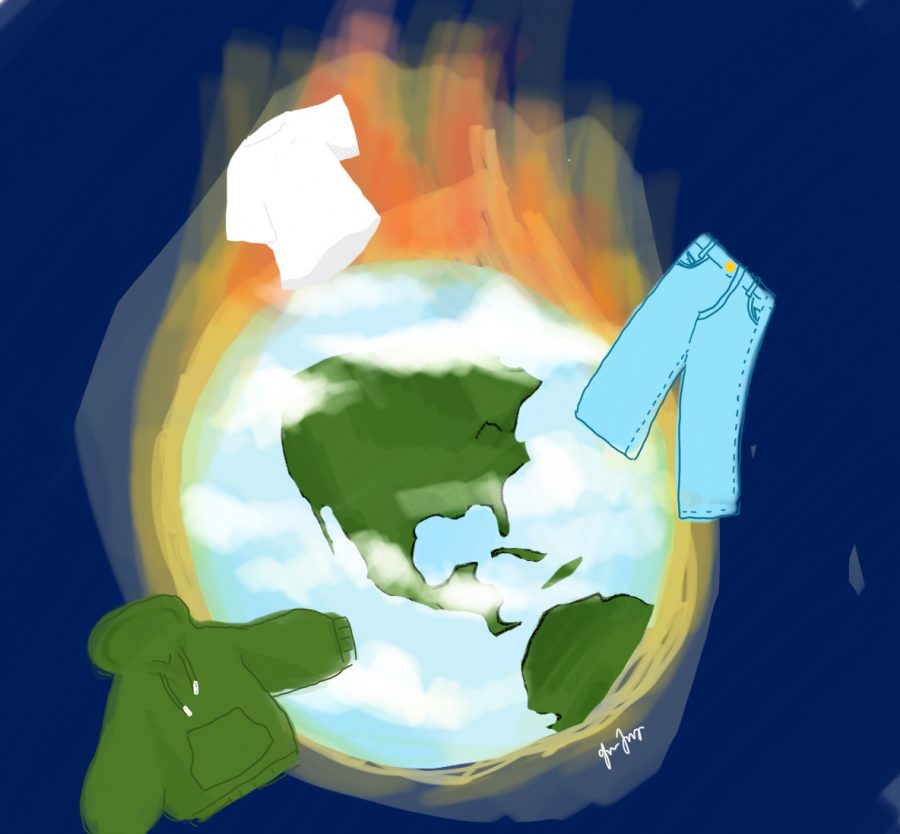Opinion: COVID-19 exposes faults in fast-fashion industry
November 19, 2020

The term “fast fashion” is used to describe inexpensive designs that move quickly from the catwalk to stores to meet new trends, and get the latest designs to a wide variety of consumers at affordable prices. Fast fashion is cheap, easily accessible and trendy. Since the start of COVID-19, there have been many changes in the fast fashion industry.
Fast fashion was undergoing major changes even before the pandemic, but since it began, major clothing company’s sales are decreasing significantly. The industry has been negatively affected on every level from retailers to supply chains. Boarded storefronts, evaporated foot traffic, and a sharp decline in consumer confidence have all pushed sales to nosedive. For example, although Zara’s online sales grew by 74%, it made a loss of $235 million in the first half of 2020. The pandemic has caused a dramatic economic contraction and sudden drop in demand. Street stores have been massively impacted by store closure; for example, H&M has announced it will be closing 70% of its stores worldwide. Many brands, such as J.C. Penney, J. Crew, and Neiman Marcus, are filing for Chapter 11 bankruptcy protection.
One of the biggest concerns with fast fashion is a lot of it is impulse and occasion driven. The companies make most of their profit from in-store impulse purchasing. Therefore, when stores close due to the pandemic, people aren’t able to try on clothes and see them in person, which isn’t as convenient. That’s why impulse purchasing drops when consumers can’t visit stores in person. Also, as people are going to fewer events, occasion-driven purchasing drops as well.
The strength of fast fashion is the price point. As people become more price-focused, sustainability and ethics may end up getting tabled. Fast fashion is not sustainable as the fashion industry is the second-largest industrial polluter, making up 10% of global pollution. A number of consumers don’t have the exclusivity or money to shop sustainably. The low prices that fast fashion companies offer are something that in uncertain economic times appeal to many customers. Convenience has become very important and although this is beneficial for the consumers, the workers behind the companies are overworked and underpaid. Garment workers are often forced to work 14 to 16 hours a day, 7 days a week. Their minimum wage is so low ($95 a month in Bangladesh) that they can’t afford to refuse overtime.
The worst hit of all will be the garment workers at the bottom of the fast-fashion supply chain. Workers in garment-producing places will be especially vulnerable to exploitation, both by the brands and their governments. Many manufacturers are now struggling with liquidity shortage and paying employees, which is leading to layoffs and factory closures. For instance, Bangladesh is the world’s second-largest apparel exporter of western fast fashion brands. A report by Bloomberg found that an estimated 1,089 garment factories in Bangladesh have had orders canceled due to the COVID-19 outbreak, costing around $1.5 billion. Some factories have shut down indefinitely, and some workers were given less than a month’s salary as compensation, but many received nothing at all. Thousands of garment workers have recently returned to work across Bangladesh as factories begin to reopen and resume production. This is going against advice from the ministry of health, raising concerns over the risk of infection to workers and their communities. This has highlighted that some companies are still putting profit over people. From a lack of care for sustainability to disregarding the safety of their workers’ well-being, fast fashion is showing the negative side of the industry, more than ever before, during the global pandemic.
In a time of fear and uncertainty, many non-profit organizations have shown support and offered help to those who were affected. One non-profit organization in Bangladesh is working to protect garment workers and is fighting for a living wage for some of the poorest people in the country. One company that is keeping its workers safe and paid during the pandemic is Everlane. Although most of their factories are still open, they have been in constant communication with the factories and suppliers, and the workers are following government guidelines and staying socially distanced. This pandemic has potentially put the brakes on major aspects of consumerism. The negative effect of COVID-19 on fast fashion has left workers jobless, sales to decrease, and leftover clothing from overproduction. There are people and organizations who are helping, but it’s not enough. Hopefully, this unique set of circumstances can bring a positive change in the fashion industry.


